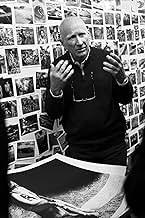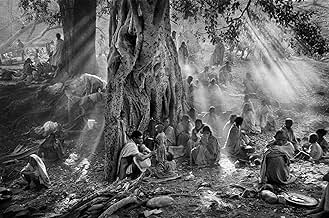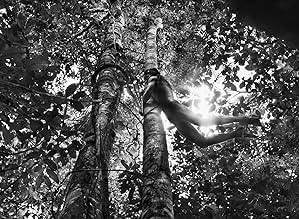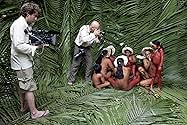PUNTUACIÓN EN IMDb
8,4/10
24 mil
TU PUNTUACIÓN
La vida y obra del fotógrafo Sebastião Salgado, que lleva cuarenta años documentando sociedades desfavorecidas en rincones escondidos del mundo.La vida y obra del fotógrafo Sebastião Salgado, que lleva cuarenta años documentando sociedades desfavorecidas en rincones escondidos del mundo.La vida y obra del fotógrafo Sebastião Salgado, que lleva cuarenta años documentando sociedades desfavorecidas en rincones escondidos del mundo.
- Nominado para 1 premio Óscar
- 14 premios y 15 nominaciones en total
Argumento
¿Sabías que...?
- CuriosidadesThe title of the film is a biblical reference, Matthew 5:13: 'You are the salt of the earth. But if the salt loses its saltiness, how can it be made salty again? It is no longer good for anything, except to be thrown out and trampled underfoot.'
- Citas
Sebastião Salgado - Photographer: We are a ferocious animal. We humans are terrible animals. Our history is a history of wars. It's an endless story, a tale of madness.
- ConexionesFeatured in The Oscars (2015)
- Banda sonoraThe Salt of the Earth
Written by Laurent Petitgand
Performed by Laurent Petitgand
Reseña destacada
THE SALT OF THE EARTH
A documentary on the photographer, Sebastiao Salgado's passion for exposing worlds that are hidden from our view as well as the undercurrents of man's greed, violence and inhumanity - all through what co-director Wim Wenders explains is the process of " drawing with light." The other director is Juliano Ribeiro Salgado, the photographer's son. For many years, I have been beguiled by Salgado's black and white imagery, particularly as source material and inspiration for many of my own late 1980s pastels. His representations are stark and at the same time filled with an expanse of tones - from the deep darkness of coal to the blinding whites which shine with the force of incorporeality; a range of imperceptibly varied grays sandwiched in-between - all breathtakingly beautiful and often reduced to abstract patternings which are in danger of overtaking his subjects, but Salgado is a master at balancing form and content.
I was particularly moved by his photographs of the fierce deprivation that droughts and famine had wreaked on Sub- Saharan Africa - particularly Ethiopia. Because Salgado exposed situations that many people were not aware of, his photos drilled a space for perception into our consciousness. Salgado has traveled to over 100 countries - projects often lasted years and the resulting books include OTHER AMERICAS, WORKERS, SAHEL - THE END OF THE ROAD, MIGRATIONS, Africa, and most recently GENESIS - the book that became his respite after years away from his native environs, witnessing the globe's devastation, including chronicling the genocide in Rawanda and the Congo. By the late 1990's he was heartbroken: "We humans are a terrible animal; we are extremely violent Our history is a history of war; it's an endless story My soul was sick I no longer believed in anything, in any salvation for the human species." (Quotes from Kenneth Turan's review in LA Times.)
THE SALT OF THE EARTH invites us to enter Salgado's personal sphere; we meet his beloved wife Leila, the enduring relationship of his life, the editor of his photographs; the mother of Juliano and Rodrigo - the youngest born with Down syndrome; the compassion and love that unites the entire family in their own personal struggles with domesticity, and the enormous achievement of reclaiming the cattle ranch that was once Salgado's home near the town of Aimores in Brazil's state of Minas Gerais. Memories of the fecund greenery and waterfalls were incised into Sebastiao's childhood recollections and when he returned in the 1990's his homeland was an environmental disaster - dry and parched.
Salgado, his spirit quenched by regarding the pillage, and spoliation around the universe was re-invigorated by Leila's dream of planting a forest in Brazil starting with a few trees and "returning the property to its natural state of subtropical rainforest and in April 1998 they founded the Instituto Terra, an environmental organization which has now been declared a Private Natural Heritage Reserve, some 17,000 acres of deforested and badly eroded land have undergone a remarkable metamorphosis More than four million seedlings native to Brazil's Atlantic Forest have been raised in the institute's own nursery " * This resuscitation propelled Salgado to travel again focusing on the beauties of the planet, resulting in his latest book GENESIS. ( *About us -The Instituto Terra.) http://bit.ly/1JQQzvd
The documentary uses Salgado's majestic photographs interspersing them with site visits to previously unrecorded locations, including old color footage; using his voice and conversations to great effect. We get a sense of the quiet strength of this man, his commitment to justice and the deep suffering that his vision extracts with the lens of a camera. The plethora of interchangeable living beings moving about silhouetted against the background of clouds billowing in the infinite skies, underscore the brevity of time and existence. We are only here for a short interval and Salgado's output is a plea for respect, justice and accommodation among the men/women/animals and the frangible cosmos we all inhabit.
A documentary on the photographer, Sebastiao Salgado's passion for exposing worlds that are hidden from our view as well as the undercurrents of man's greed, violence and inhumanity - all through what co-director Wim Wenders explains is the process of " drawing with light." The other director is Juliano Ribeiro Salgado, the photographer's son. For many years, I have been beguiled by Salgado's black and white imagery, particularly as source material and inspiration for many of my own late 1980s pastels. His representations are stark and at the same time filled with an expanse of tones - from the deep darkness of coal to the blinding whites which shine with the force of incorporeality; a range of imperceptibly varied grays sandwiched in-between - all breathtakingly beautiful and often reduced to abstract patternings which are in danger of overtaking his subjects, but Salgado is a master at balancing form and content.
I was particularly moved by his photographs of the fierce deprivation that droughts and famine had wreaked on Sub- Saharan Africa - particularly Ethiopia. Because Salgado exposed situations that many people were not aware of, his photos drilled a space for perception into our consciousness. Salgado has traveled to over 100 countries - projects often lasted years and the resulting books include OTHER AMERICAS, WORKERS, SAHEL - THE END OF THE ROAD, MIGRATIONS, Africa, and most recently GENESIS - the book that became his respite after years away from his native environs, witnessing the globe's devastation, including chronicling the genocide in Rawanda and the Congo. By the late 1990's he was heartbroken: "We humans are a terrible animal; we are extremely violent Our history is a history of war; it's an endless story My soul was sick I no longer believed in anything, in any salvation for the human species." (Quotes from Kenneth Turan's review in LA Times.)
THE SALT OF THE EARTH invites us to enter Salgado's personal sphere; we meet his beloved wife Leila, the enduring relationship of his life, the editor of his photographs; the mother of Juliano and Rodrigo - the youngest born with Down syndrome; the compassion and love that unites the entire family in their own personal struggles with domesticity, and the enormous achievement of reclaiming the cattle ranch that was once Salgado's home near the town of Aimores in Brazil's state of Minas Gerais. Memories of the fecund greenery and waterfalls were incised into Sebastiao's childhood recollections and when he returned in the 1990's his homeland was an environmental disaster - dry and parched.
Salgado, his spirit quenched by regarding the pillage, and spoliation around the universe was re-invigorated by Leila's dream of planting a forest in Brazil starting with a few trees and "returning the property to its natural state of subtropical rainforest and in April 1998 they founded the Instituto Terra, an environmental organization which has now been declared a Private Natural Heritage Reserve, some 17,000 acres of deforested and badly eroded land have undergone a remarkable metamorphosis More than four million seedlings native to Brazil's Atlantic Forest have been raised in the institute's own nursery " * This resuscitation propelled Salgado to travel again focusing on the beauties of the planet, resulting in his latest book GENESIS. ( *About us -The Instituto Terra.) http://bit.ly/1JQQzvd
The documentary uses Salgado's majestic photographs interspersing them with site visits to previously unrecorded locations, including old color footage; using his voice and conversations to great effect. We get a sense of the quiet strength of this man, his commitment to justice and the deep suffering that his vision extracts with the lens of a camera. The plethora of interchangeable living beings moving about silhouetted against the background of clouds billowing in the infinite skies, underscore the brevity of time and existence. We are only here for a short interval and Salgado's output is a plea for respect, justice and accommodation among the men/women/animals and the frangible cosmos we all inhabit.
- graupepillard
- 5 may 2015
- Enlace permanente
Selecciones populares
Inicia sesión para calificar y añadir a tu lista para recibir recomendaciones personalizadas
- How long is The Salt of the Earth?Con tecnología de Alexa
Detalles
- Fecha de lanzamiento
- Países de origen
- Sitio oficial
- Idiomas
- Títulos en diferentes países
- The Salt of the Earth
- Localizaciones del rodaje
- Yalimo, Papua, Indonesia(Yali tribe)
- Empresas productoras
- Ver más compañías en los créditos en IMDbPro
Taquilla
- Recaudación en Estados Unidos y Canadá
- 1.343.349 US$
- Fin de semana de estreno en EE. UU. y Canadá
- 44.900 US$
- 29 mar 2015
- Recaudación en todo el mundo
- 5.412.466 US$
- Duración1 hora 50 minutos
- Color
- Mezcla de sonido
- Relación de aspecto
- 1.85 : 1
Contribuir a esta página
Sugerir un cambio o añadir el contenido que falta

Principal laguna de datos
What is the Canadian French language plot outline for La sal de la Tierra (2014)?
Responde
![Ver Bande-annonce [OV]](https://m.media-amazon.com/images/M/MV5BMTY0M2ZjMzYtZmJiZC00MDRlLTljNWMtMDRiNmQ1YTgwM2EyXkEyXkFqcGdeQXRyYW5zY29kZS13b3JrZmxvdw@@._V1_QL75_UX500_CR0)


























